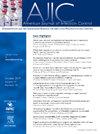Analysis of an expanded admission screening protocol for Candida auris at a New York City hospital
IF 3.8
3区 医学
Q2 INFECTIOUS DISEASES
引用次数: 0
Abstract
Background
Candida auris (C auris) is an emerging global infectious disease threat, and screening practices for identification of C auris are inconsistent across healthcare facilities. This study describes the utility of expanding a C auris admission screening protocol at an acute care hospital to screen all patients presenting from any skilled nursing facility.
Methods
A retrospective review identified all patients screened on admission for C auris from January 2022 through September 2023. Patients were identified for risk potential, and those deemed high risk were placed on transmission-based precautions while awaiting culture results.
Results
Of the 591 patients screened, 14 cases were identified (2.4%). Nine cases presented with tracheostomies or were ventilator-dependent and classified as high risk. Five cases were considered low risk at the time of screening. Eight of these newly identified cases would not be screened under the prior criteria.
Discussion
This study’s findings support prior studies that patients with tracheostomies or were ventilator-dependent have greater risk for C auris colonization. Adopting an expanded admission screening program has allowed the hospital to detect more cases earlier to prevent nosocomial transmissions.
Conclusions
Healthcare facilities should consider initiating or expanding admission screening programs for C auris based on community prevalence rates of C auris.
分析纽约市一家医院的念珠菌入院筛查扩展方案。
背景:白色念珠菌(C auris)是一种新出现的全球性传染病威胁,各医疗机构对白色念珠菌的筛查方法并不一致。本研究介绍了将一家急症医院的念珠菌入院筛查方案扩大到筛查来自任何专业护理机构的所有患者的效用:方法:通过回顾性分析,确定了 2022 年 1 月至 2023 年 9 月期间所有接受 C auris 入院筛查的患者。在等待培养结果期间,对患者进行风险可能性鉴定,并对被视为高风险的患者采取基于传播的预防措施:在接受筛查的 591 名患者中,发现了 14 例病例(2.4%)。其中九例患者使用气管插管或依赖呼吸机,被列为高危患者。五例在筛查时被认为是低风险。在这些新发现的病例中,有 8 例在之前的标准下不会被筛查:讨论:本研究结果支持之前的研究,即气管造口或依赖呼吸机的患者有更高的结肠球菌定植风险。通过扩大入院筛查计划,医院可以更早地发现更多病例,从而防止院内传播:结论:医疗机构应根据社区的 C auris 感染率,考虑启动或扩大 C auris 入院筛查计划。
本文章由计算机程序翻译,如有差异,请以英文原文为准。
求助全文
约1分钟内获得全文
求助全文
来源期刊
CiteScore
7.40
自引率
4.10%
发文量
479
审稿时长
24 days
期刊介绍:
AJIC covers key topics and issues in infection control and epidemiology. Infection control professionals, including physicians, nurses, and epidemiologists, rely on AJIC for peer-reviewed articles covering clinical topics as well as original research. As the official publication of the Association for Professionals in Infection Control and Epidemiology (APIC)

 求助内容:
求助内容: 应助结果提醒方式:
应助结果提醒方式:


